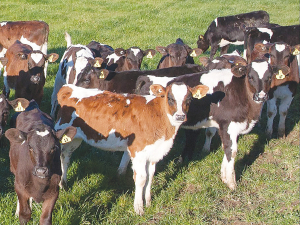Another Windfall for Fonterra Farmers, Unit Holders
Fonterra farmer shareholders and unit holders are in line for another payment in April.
 From 1 June this year, Fonterra suppliers have to record information about how many calves are born on-farm and where they go.
From 1 June this year, Fonterra suppliers have to record information about how many calves are born on-farm and where they go.
As part of its strategic choice to lead in sustainability, Fonterra places a strong emphasis on calf wellbeing.
A big part of this is ensuring that all dairy calves have a useful life and this is why Fonterra says it introduced a new clause in the Terms of Supply relating to calves.
“This year on 1 June, our Terms of Supply will change to update clause 6.3 for calf wellbeing. This clause states that you can only euthanise calves on farm if it is required on humane grounds, or if the calves are not able to be raised on farm and there are no options for third-party sale or processing.
“Animal wellbeing is important to Fonterra’s farmers, customers and consumers and Fonterra references the Five Domains as well as the Five Freedoms when describing our animal welfare approach.
“The Five Domains model of animal welfare is a framework which focuses on how animals feel and allows us to look beyond minimising suffering to strive for a good life for animals. Our farmers strive to provide positive experiences for cattle in all four physical domains to ensure their cows and calves are wellfed, comfortable, healthy, and content.”
Most Fonterra farmers won’t need to alter their current practices because of the change to our Terms of Supply. However, Fonterra says it understands the change may be a challenge for some, so it is working to help find more options through each region across the country.
Customers and consumers continue to indicate that a high standard of cow and calf wellbeing is expected. Global markets are also making changes, for example in the United Kingdom, the Great British Dairy Calf Strategy has been developed which commits to rearing all calves with care and eliminating the practice of euthanasia of calves by 2023.
On most New Zealand farms, 20-25% of the calves born each season are kept as replacement heifers. The remaining calves not destined to enter the milking herd are termed non-replacement calves.
These calves may be reared for beef or sent for processing into meat for human consumption and petfood, as well as valuable co-products used for applications such as vaccine development, cheese production, fertiliser production and manufacturing of fashion items.
From 1 June this year, Fonterra suppliers will need to record information about how many calves are born on-farm and where they go.
Farmers may/will be asked to show these records during future Farm Dairy Assessments.
Article sourced from Farm Source
Agrisea NZ has appointed Craig Hudson as it's new chief growth officer.
State farmer Landcorp, trading as Pamu, is a forecasting a full-year net profit of around $100 million.
Tony Aitken, chief executive of Ruralco, has been awarded the Excellence in Business Leadership Award at the ANZ Business of the Year Awards.
Global trade has been thrown into another bout of uncertainty following the overnight ruling by US Supreme Court, striking down President Donald Trump's decision to impose additional tariffs on trading partners.
Controls on the movement of fruit and vegetables in the Auckland suburb of Mt Roskill have been lifted.
Fonterra farmer shareholders and unit holders are in line for another payment in April.
OPINION: Staying with politics, with less than nine months to go before the general elections, there’s confusion in the Labour…
OPINION: Winston Peters' tirade against the free trade deal stitched with India may not be all political posturing by the…